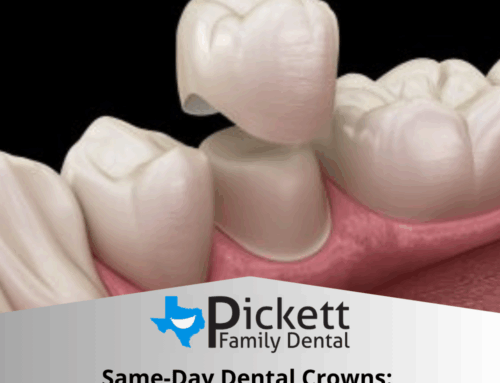We help patients in Keller, TX restore their smiles with dental implants and custom dentures designed for long-term comfort, health, and confidence.
Tooth loss can change far more than just the way your smile looks. It can affect your ability to eat, speak, and even maintain bone strength in your jaw. For many patients, the question isn’t whether to replace missing teeth—it’s how. Should you choose dental implants or dentures?
Both solutions can restore your smile, but they work in very different ways. At Pickett Family Dental, we help patients understand the advantages of each option based on their goals, lifestyle, and long-term oral health. When it comes to lasting benefits, dental implants often provide superior support, strength, and overall wellness. Let’s look at how both compare—and why implants might be the better choice for your long-term health.
How Dental Implants Work
Dental implants are small titanium posts that are surgically placed into the jawbone to act as artificial tooth roots. Once healed, these implants fuse naturally with the bone in a process called osseointegration. A custom restoration—like a crown, bridge, or denture—is then attached securely to the implants.
Because implants mimic natural tooth roots, they provide unmatched stability and strength. They don’t move, click, or shift, and they allow you to chew just as you would with your natural teeth.

How Dentures Work
Dentures rest on top of the gums and are held in place by suction, adhesives, or dental clasps (in the case of partial dentures). Modern dentures are more comfortable and natural-looking than ever, but they don’t connect directly to the bone. Over time, this lack of stimulation can cause the jawbone to shrink, changing the fit of the denture and the shape of your face.
While dentures can be a great short-term or budget-friendly solution, they often need adjustments, relining, or replacement every few years.
Jawbone Health: The Biggest Difference
When you lose a tooth, the jawbone underneath no longer receives the pressure and stimulation that comes from chewing. Without this, the bone gradually begins to deteriorate—a process known as bone resorption.
Implants are the only tooth replacement option that prevents bone loss. The titanium post acts like a natural root, keeping the bone strong and dense. Dentures, on the other hand, simply rest on the gums and do not provide this crucial stimulation.
Over time, patients who rely solely on dentures may experience:
-
Jawbone shrinkage
-
Sunken facial appearance
-
Difficulty keeping dentures in place
-
Reduced bite strength
Dental implants not only restore your teeth—they help preserve the structure of your face and the long-term health of your jaw.
Comfort and Functionality
Comfort is a major factor in long-term oral health. Because implants are permanently anchored, they feel just like natural teeth. You can eat steak, apples, or corn on the cob without worry. There’s no slipping, no adhesives, and no discomfort caused by friction or rubbing against the gums.
Dentures can restore function to a degree, but they may shift or become loose over time—especially as bone loss progresses. This can make chewing certain foods difficult and may affect digestion if you’re forced to eat a softer diet.
Oral Hygiene and Maintenance
Caring for dental implants is simple. You brush, floss, and schedule regular cleanings just as you would with natural teeth. Implants can’t decay, but the gums around them still need to stay healthy to prevent infection.
Dentures, however, require daily removal, cleaning, and soaking to stay hygienic. Food particles and bacteria can get trapped underneath, which may lead to gum irritation or bad breath if not properly cleaned.
For patients who want a maintenance routine that feels natural and simple, implants are typically the preferred choice.
Durability and Longevity
Dental implants are built to last. With proper care, they can remain strong and functional for 20 years or more—often a lifetime. The crown or denture attached to them may eventually need replacement, but the implant itself is designed for permanent use.
Traditional dentures usually need replacement every 5 to 10 years as the gum and bone structure change. That means repeated adjustments, relines, and new fittings over time.
While implants have a higher upfront cost, they often end up being the more cost-effective solution in the long run because they don’t require frequent replacement.
The Impact on Overall Health
Tooth replacement isn’t just about appearance—it’s also about long-term health and nutrition. Patients with dental implants can eat a wide range of foods, including fruits, vegetables, and proteins that support a balanced diet.
Those with poorly fitting dentures may avoid certain foods, leading to nutritional deficiencies over time. Additionally, because implants help preserve jawbone and gum health, they reduce inflammation in the mouth, which has been linked to heart disease, diabetes, and other systemic health concerns.
When your mouth functions as it should, your entire body benefits.
When Dentures Still Make Sense
Although implants offer the best long-term health benefits, dentures remain a good solution for some patients. If you have significant bone loss, certain medical conditions, or prefer a non-surgical option, dentures can still restore function and appearance.
For those who want a middle ground, implant-supported dentures provide the best of both worlds—offering the stability of implants with the full-arch coverage of dentures. These hybrid options stay securely in place while reducing bone loss and improving chewing strength.
Restoring Your Smile and Protecting Long-Term Health
Choosing between implants and dentures is a big decision—but it’s one that can truly change your future comfort, confidence, and health. At Pickett Family Dental in Keller, TX, we take the time to understand your goals, your health, and your lifestyle before creating a plan that feels right for you.
Whether you want the lasting stability of implants or the convenience of modern dentures, you’ll receive honest recommendations and exceptional care every step of the way. Our goal is simple: to give you a smile that’s strong, functional, and natural for years to come.
If you’ve been living with missing teeth or struggling with an ill-fitting denture, now is the perfect time to explore your options. Schedule a consultation and discover how a personalized tooth replacement plan can help you eat better, smile freely, and live more confidently every day.



